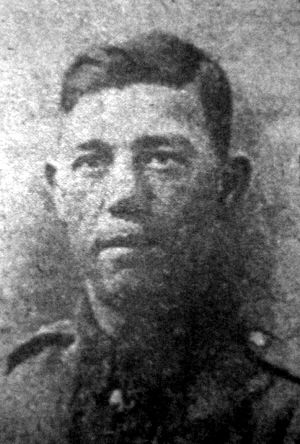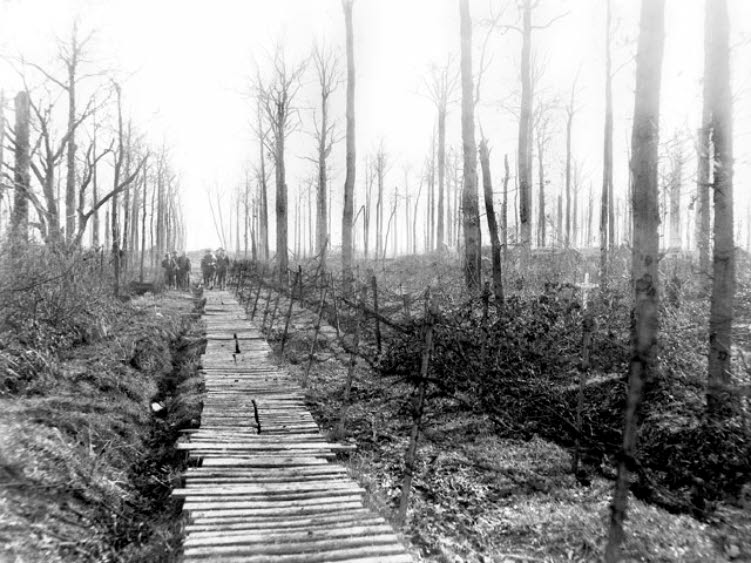
Clifford Manners was born in Great Preston, near Castleford in early 1898, the eldest child born to coal miner Frederick William Manners and his wife, Ossett-born Martha (nee Dews), who married at South Ossett Christ Church on the 20th November 1897. The couple had six children, but sadly two died before April 1911.
Frederick Manners was born at Bardsey near Wetherby, and his wife Martha moved to Ossett in the late 1890s and by 1901 they were living at Hilda Street, Ossett where their second son, Fred, was born in May 1900. Sadly he died in 1902 and by 1911 Frederick and Martha, had moved to North Shields, near Newcastle-upon-Tyne, together with their son, 11 year-old schoolboy, Clifford Manners, and three daughters, aged 9, 7 and 4 years. At some later stage, the family moved back to Ossett, and were living on South Parade at the time of Clifford’s death in October 1918.
Clifford Manners’s army service record has not survived, but it is known that in April 1918, shortly after his 18th birthday, he enlisted at Seaham Harbour, Northumberland and joined the Kings Own Yorkshire Light Infantry (service number 52816). He subsequently transferred to the 10th Battalion, East Yorkshire Regiment with service number 51777. He embarked for France in September 1918, just three weeks before his death. Private Clifford Manners was posthumously awarded the British and Victory medals.
The 10th (Service) Battalion (1st Hull) of the East Yorkshire Regiment was known as the Hull Commercials and was raised in Hull on the 29th of August 1914 by Lord Nunburnholme and the East Riding TF Association. In May 1915 The Battalion joined the 92nd Brigade, 31st Division moving to Penkridge Bank Camp near Rugeley, then later to Ripon and Hurdcott Camp near Salisbury. In December 1915 they set sail for Alexandria in Egypt to defend the Suez Canal. In March 1916 The 31st Division left Port Said aboard HMT ‘Briton’ bound for Marseilles in France, a journey which took five days. They travelled by train to Pont Remy, a few miles south east of Abbeville and marched to Bertrancourt arriving on the 29th March 1916. Not long after arriving on the Western Front they took over a stretch of the front line opposite the village of Serre at the northern most end of The Somme, suffering very heavy casualties as the battle was launched. In 1917 they were in action in the Battle of Arras and in 1918 they fought at St Quentin, Bapaume and Arras before moving north to counter the German Spring Offensive on the Lys. Towards the end of the conflict they were in action in the the Final Advance in Flanders.
The village of Ploegsteert – ‘Plugstreet’ to the British troops during the Great War was at the southern end of the Ypres battlefields and was dominated by a huge expanse of woodland: Plugstreet Wood. The area saw fighting in the First Battle of Ypres in October 1914, but then settled down to static trench warfare and rapidly became known as a ‘nursery sector’ where units fresh from England could acclimatise to the conditions of trench warfare. Many famous people served here in WW1: author Henry Williamson in 1914, war poet Roland Leighton in 1915, plus Winston Churchill and Anthony Eden in 1916.
Private Clifford Manners was fatally wounded between the 28th September and 30th October 1918 during the Fifth Battle of Ypres when the 10th Battalion of the East Yorkshire Regiment as part of the 31st Division, was in action during the final advance in Flanders. At 5.30 a.m. on the 28th September 1918, the Belgian Army and British 2nd Army attacked at Ypres. On the right of the main offensive at Ypres, the 11th East Lancashire Regiment (Accrington Pals) and the 10th East Yorkshire Regiment (Hull Commercials) were deployed for attack on Hill 63, north-west of Ploegsteert Wood and this is probably where Clifford Manners was wounded.
Clifford Manners was taken to the 1st or 2nd Australian Casualty Clearing Station near La Kreule where he died of his wounds on the 1st October 1918.
The “Ossett Observer” 1 had this obituary for Clifford Manners:
“Ossett Common Soldier’s Death – Information has come to hand that Private Clifford Manners (20), East Yorkshire Regiment, whose home is at South-parade, Ossett Common, and whom last week was reported to have been wounded in action, died from his wounds on October 1st. Deceased who joined the army in April, had only been in France three weeks when he was fatally wounded. He used to work at Old Roundwood Collieries.”

Above: The duckwalk in Ploegsteert Wood in February 1918.
Private Clifford Manners, aged 21 years, son of Fred and Martha A. Manners, of Ossett, died on the 1st October 1918. He is buried at grave reference VI. A. 9. at the La Kreule Military Cemetery, Hazebrouck,2 Nord, France. La Kreule is a small hamlet 2 kilometres north of Hazebrouck, on the road to St Sylvestre-Cappel and Steenvoorde.
La Kreule Military Cemetery was opened in April 1918 by the 1st and 2nd Australian Casualty Clearing Stations, which came back from Outtersteene ahead of the German advance, and the 17th, which arrived from Lijssenthoek. These three stations, known collectively as “Ana Jana Siding”, were posted to the north of La Kreule, but in the middle of April they withdrew to Blendecques, near St. Omer, and the cemetery was then used by heavy artillery and fighting units. In October 1918, the 17th Casualty Clearing Station returned with the 8th and the 64th and the cemetery was closed at the end of the month.
The cemetery contains 576 Commonwealth burials of the First World War and 11 German war graves.
References:
1. “Ossett Observer”, 12th October 1918